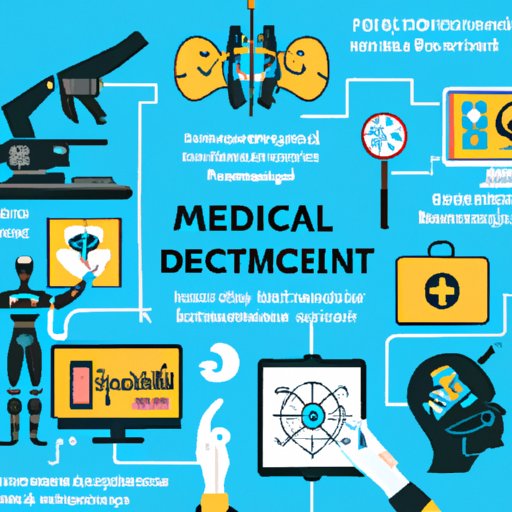Introduction
Medical technologies are tools and techniques used to improve the diagnosis, treatment, and prevention of diseases. They range from simple devices such as stethoscopes to complex computer-assisted imaging systems. Medical technologies can be used to diagnose and monitor diseases, develop treatments, and even prevent illnesses. These technologies have revolutionized modern healthcare and are continuing to evolve.
Benefits of Medical Technologies
Medical technologies offer numerous benefits to healthcare providers and patients alike. Improved patient care is one of the primary advantages of using medical technologies. With the use of medical technologies, doctors can more accurately diagnose and treat a variety of conditions. This results in better outcomes for patients and fewer complications. Additionally, medical technologies can reduce the time it takes to diagnose and treat a patient, which can lead to faster recovery times.
The use of medical technologies can also result in cost savings for healthcare providers. For example, diagnostic technologies such as CT scans, MRIs, and ultrasounds can reduce the need for additional tests and treatments, resulting in lower costs for both the patient and the provider. Furthermore, the use of medical technologies can increase the efficiency of healthcare providers. By automating certain processes, healthcare providers can spend less time on paperwork and more time caring for patients.
Types of Medical Technologies
Medical technologies can be divided into three main categories: diagnostic technologies, therapeutic technologies, and monitoring technologies. Diagnostic technologies are used to diagnose and monitor diseases. Examples of these technologies include X-rays, CT scans, ultrasound, and MRI. Therapeutic technologies are used to treat diseases. Examples of these include surgical instruments, pacemakers, and stents. Monitoring technologies are used to track a patient’s health over time. Examples of these include wearables, remote monitoring systems, and home healthcare devices.
Trends in Medical Technologies
Recent advances in medical technologies have made it possible to diagnose and treat a wide range of conditions with greater accuracy and precision than ever before. Advances in diagnostics have enabled healthcare providers to detect diseases earlier and more accurately. Automation and robotics are also being used to streamline processes and reduce human error. Additionally, wearable devices are becoming increasingly popular in the healthcare industry. These devices allow patients to continuously monitor their health, enabling them to make informed decisions about their care.
Challenges with Medical Technologies
Although medical technologies offer numerous benefits, they can also present some challenges. One of the biggest challenges is the skill gap. Healthcare providers must be trained to use medical technologies effectively, and this can take time and resources. Additionally, medical technologies often involve the collection and storage of personal data, which raises concerns about data security. Finally, healthcare providers must be aware of regulatory compliance when using medical technologies.
Ethical Considerations for Medical Technologies
The use of medical technologies raises a number of ethical considerations. Privacy issues are of particular concern, as personal data collected by medical technologies can be misused or leaked. Accessibility is another issue, as not everyone has access to medical technologies due to cost or availability. Finally, autonomy is an important consideration, as medical technologies can be used to control or influence a patient’s decisions.
Conclusion
Medical technologies are powerful tools that can transform healthcare. They offer numerous benefits, including improved patient care, cost savings, and increased efficiency. There are many types of medical technologies, ranging from diagnostic technologies to therapeutic technologies to monitoring technologies. In addition, recent advances in medical technologies have led to new trends such as automation and robotics, and wearable devices. However, medical technologies can also present some challenges, such as the skill gap and data security concerns. Finally, there are a number of ethical considerations to keep in mind when using medical technologies, including privacy, accessibility, and autonomy.
(Note: Is this article not meeting your expectations? Do you have knowledge or insights to share? Unlock new opportunities and expand your reach by joining our authors team. Click Registration to join us and share your expertise with our readers.)
